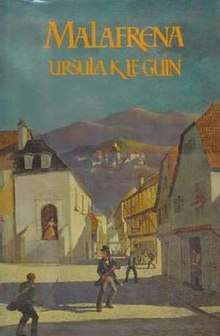Malafrena
Malafrena is a 1979 novel by Ursula K. Le Guin. The only fantastic element of this novel is that it takes place in the imaginary Central European country of Orsinia, which is also the setting of her collection Orsinian Tales.
 Cover of first edition (hardcover) | |
| Author | Ursula K. Le Guin |
|---|---|
| Cover artist | Michael Mariano |
| Country | United States |
| Language | English |
| Genre | Fantasy literature |
| Publisher | Berkley Publishing Corporation |
Publication date | 1979 |
| Media type | Print (Hardcover and Paperback) |
| Pages | 369 (First edition) |
| ISBN | 0-399-12410-1 (First edition, hardcover) |
| OCLC | 4805125 |
| 813/.5/4 | |
| LC Class | PZ4.L518 Mal 1979 PS3562.E42 |
In many ways, Malafrena reads like a 19th-century novel, with its many detailed characters, its political and romantic subplots, its lack of the supernatural, and its settings that range from the mansions of the aristocracy to slums and a prison. Malafrena is written for an adult audience, rather than children and young adults, the target readership of most of Le Guin's works in the period 1979-1994.[1]
Plot summary
The story takes place from 1825 to 1830, when Orsinia is ruled by the Austrian Empire. The hero is Itale Sorde, the son of the owner of an estate on a lake called Malafrena in a valley of the same name. Itale leaves the estate, against his father's will, to engage in nationalistic and revolutionary politics in the capital.
Characters
- Itale Sorde: The protagonist of the story.
- Laura Sorde: Itale's sister.
- Guide Sorde: Itale's father.
- Emanuel Sorde: Itale's uncle.
- Eleonora: Itale's mother.
- Tomas Brelavay: School friend and collaborator in Krasnoy.
- Givan Frenin: School friend and collaborator in Krasnoy.
- Count Orlant Valtorskar: Neighbor and family friend.
- Piera Valtorskar: Neighbor and family friend.
- Luisa Paludeskar: A young noble woman in Krasnoy.
- Enrike Paludeskar: Luisa's brother.
- Amadey Estenskar: A writer from Polana province.
Literary significance and criticism
Mike Cadden notes that Malafrena has not received as much critical attention as many of Le Guin's other works, primarily because the characters in the story do not connect well with one another.[2] An imperceptible, omniscient author is used to tell the story, and Le Guin herself acknowledges one of the strongest influences on her Orsinian works is Russian literature.[3]
Greg Costikyan reviewed Malafrena in Ares Magazine #6 and commented that "Malafrena seems to say that visionaries are often or usually destroyed, and though tragic, this must always be the case, for humanity cannot progress without them."[4]
References
- Cadden, Mike. Ursula K. Le Guin Beyond Genre: Fiction for Children and Adults, (New York, NY: Routledge, 2005) page 114.
- Cadden, Mike. Ursula K. Le Guin Beyond Genre: Fiction for Children and Adults, (New York, NY: Routledge, 2005) page 30.
- Cadden, Mike. Ursula K. Le Guin Beyond Genre: Fiction for Children and Adults, (New York, NY: Routledge, 2005) page 153.
- Costikyan, Greg (January 1981). "Books". Ares Magazine. Simulations Publications, Inc. (6): 30.
Sources
- Cadden, Mike (2005). Ursula K. Le Guin Beyond Genre: Fiction for Children and Adults (1st ed.). New York, NY: Routledge. ISBN 0-415-99527-2.